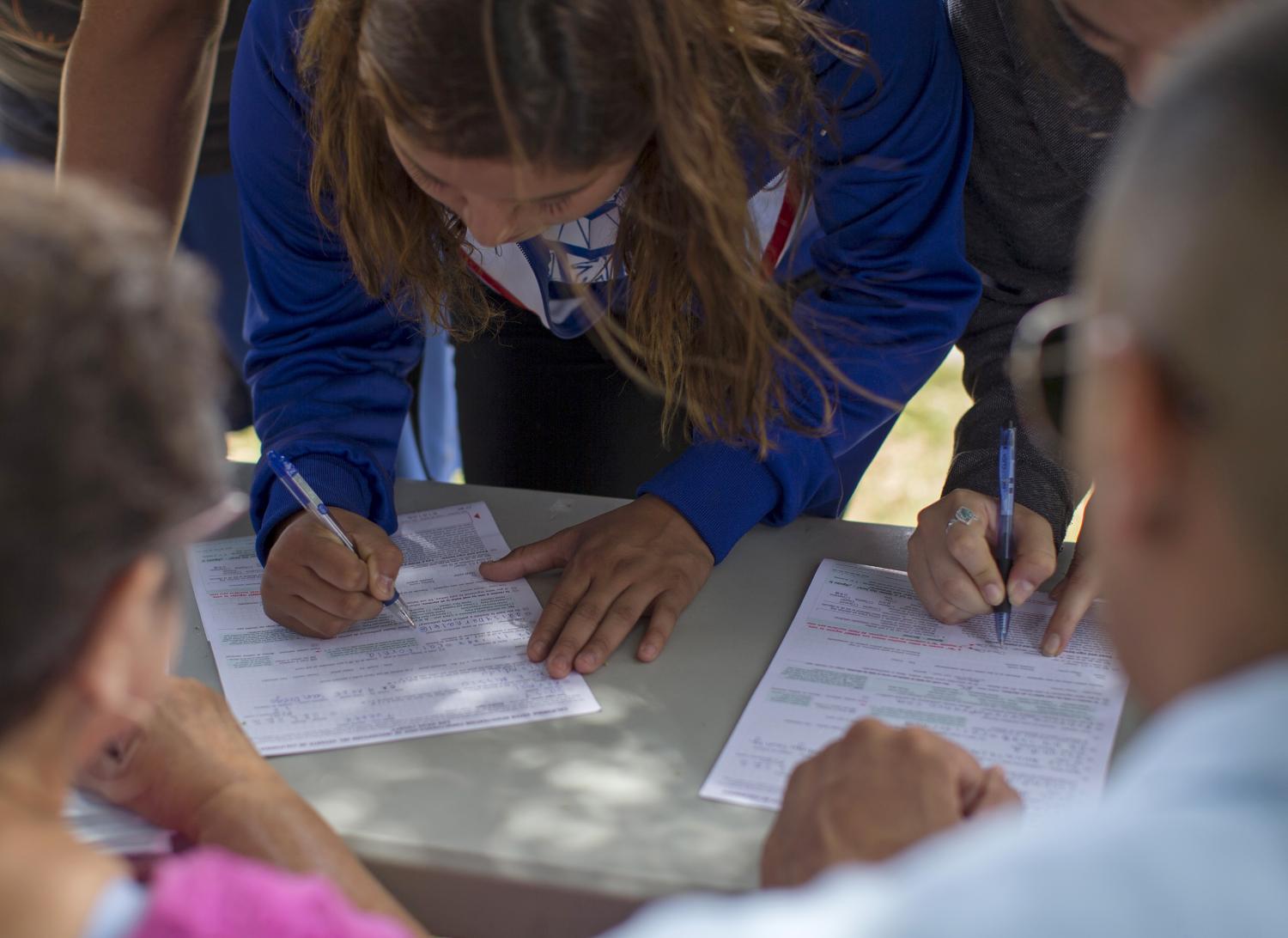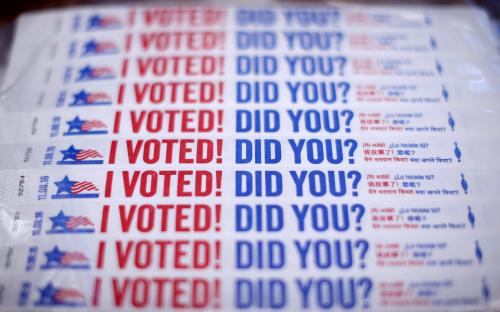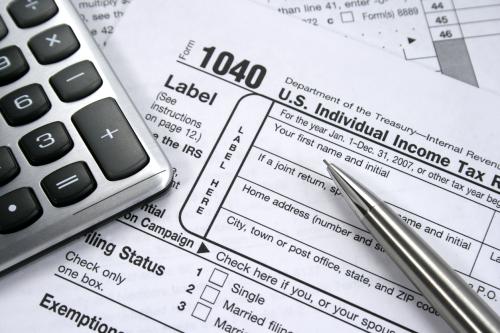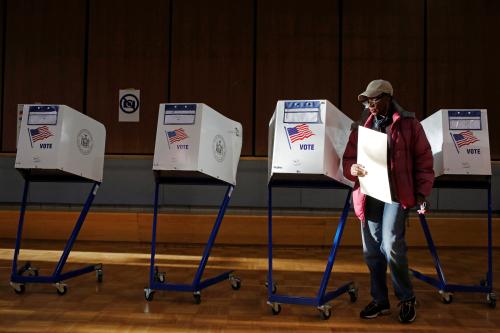Imagine if next April, as your family and 150 million other American households prepare to file their federal income taxes, everyone was asked one simple question: “Would you like to register to vote or update your voter registration?” Filing federal income taxes is one of the only times each year that most Americans interact directly with the federal government. Income taxes have become such a part of American civic culture that one of the questions included on the naturalization test for new citizens is, “When is the last day you can send in federal income tax forms?”
Ensuring that every citizen is able to vote is one of the most important tasks facing American democracy. In this piece, I propose making voter registration available at income tax filing. This policy would increase the representativeness of the registered population, provide an annual opportunity for millions of Americans to ensure that their registration is up-to-date, and reduce the paperwork burden associated with voting.
Low voter registration is a problem
More than one in five eligible voters currently is not registered to vote. While some states have eased the voter registration process or moved toward automatic voter registration, lawmakers in 25 states have put in place new voting restrictions since 2010, according to the nonprofit Brennan Center for Justice. The new restrictions echo a reactionary tradition of voter disenfranchisement that has targeted poor people and people of color for centuries.
Low voter registration is a problem because the unregistered are ineligible to vote. Their views do not get represented in elections and their voices typically go unheard. Ensuring universal voter registration would not resolve the many ways that wealth influences policy outcomes, but it would remove one significant barrier to participation and thereby increase the likelihood that politicians would take into account the preferences of the American electorate’s full diversity. Providing a voter registration opportunity at tax time would be a major step toward universal registration.
Why voter registration at tax time would help
Voter registration at tax time, along with other pro-voter reforms such as early voting and same-day registration, could combat low voter registration levels and low voter turnout. Voter registration at tax time would serve as a complement to automatic voter registration in states enacting those procedures, while acting as a counterweight in states where voter suppression policies have been put in place.
Voter registration at tax filing makes sense for many reasons. First, four practical reasons:
- Enormous scope. More than 150 million householdsfile their income taxes every year.
- Reduced red tape. Tax filers are already completing complicated forms for a government agency; the addition of the comparatively brief voter registration form would reduce citizens’ bureaucratic interactions.
- An annual reminder. One challenge with maintaining voter registration rates is the need to re-register upon moving. Because tax filing is an annual process, it would help keep voters on the rolls.
- Early timing. Being registered to vote early in an election year gives voters more time to learn about the candidates and issues. In many states, tax time registration would put voters on the rolls in time to vote in primary elections as well as the November general election.
Tax-time registration has more going for it than just logistical considerations. It also has a more philosophical appeal for Americans.
- A link between taxation and representation. Since the American Revolution, Americans have associated taxpaying with the right of representation; my own research demonstrates that citizens see taxpaying as a responsibility like voting.
- A reminder of the role of government. Maybe you are happy to be getting a refund, or angry about where you think the money is going, but when you file your taxes, it is all-but-impossible to think that “government doesn’t matter to me.”
- Inclusion for lower-income Americans. Income tax filing is critical for many working families who rely on the earned income and child tax credits to supplement their incomes. For these households, the experience of tax filing is a comparatively positive government interaction that provokes feelings of pride and inclusion, and therefore encourages civic participation.
Demonstrated effectiveness of this reform
The impact of voter registration at tax time is not theoretical; experimental evidence demonstrates its effectiveness. In 2018, we conducted a randomized controlled trial of a voter registration campaign at seven nonprofit free tax preparation sites in Dallas, Texas, and Cleveland, Ohio.

We found that the program more than doubled the likelihood of unregistered tax filers registering to vote. The effects were twice as large for people under 35 years old. The impact on voter registration also carried over into voter turnout. In the 2018 Ohio primary election, those who participated in the experiment voted at slightly higher rates than the state average—even though the population participating in the experiment were lower income and predominantly non-white, groups that have traditionally been under-represented at the polls.
How to implement voter registration at tax time
Three main routes to implementing voter registration at tax time are: federal policy change, state policy change, and voluntary adoption by tax preparers. Broadly speaking, federal legislation would have the largest impact but faces the greatest hurdles to implementation, while state legislation is logistically easier but limited in scope. Voluntary adoption has the greatest promise in the immediate term. These three avenues to implementation are not mutually exclusive.
Federal legislation
At the federal level, legislation could mandate that tax preparers and tax filing software providers offer voter registration materials to clients. A “Filer Voter” policy would extend the reach of the National Voting Registration Act of 1993, colloquially known as the “Motor Voter” Act, which requires state governments to help eligible citizens register to vote when they visit the Department of Motor Vehicles or any state agency providing public assistance. About 79 million tax returns are filed each year by paid tax preparers, and an additional 51 million returns are filed electronically.
The impact of such legislation would depend substantially on whether tax preparers were required only to provide either paper voter registration forms or links to online voter registration, or—likely more effective—if tax preparers were obliged to submit completed forms. In addition, analyses of the NVRA reveal that the effectiveness of voter registration mandates depends heavily on the level of local compliance. More effective “Filer Voter” legislation would include strong enforcement mechanisms.
In principle, federal legislation could also include a voter registration form along with the standard 1040 income tax form for personal income taxes. However, because voting is managed at the state and local levels, a federal approach would require large improvements in governmental information sharing.
State policy change
An easier lift from an implementation perspective would be state-level policy change. As at the federal level, state legislators could mandate that tax preparers offer voter registration materials to clients when filing their taxes and, in the 41 states with state income taxes, include voter registration on the state income tax form. Such a policy would be a natural complement to the automatic voter registration procedures.
States could also designate tax agencies as government institutions covered by the NVRA without passing legislation. Depending on the state, this decision can be made unilaterally by the governor or the tax agency itself. Nongovernmental organizations can also be covered by the NVRA if they choose to participate, paving the way for tax preparation companies to partner with state governments.
As with all automatic voter registration policies, an important technical challenge to tax time voter registration is ensuring only eligible voters are registered. For instance, noncitizens who earn income in the United States file income tax returns. This problem is far from insurmountable. The voter registration form clearly requires those who complete it to attest that they are U.S. citizens. Canada, which has a higher foreign-born population than the United States, includes voter registration on its income tax forms.
Voluntary adoption
The final approach to voter registration at tax time, and the one with the greatest promise in the immediate term, is voluntary adoption of voter registration by tax preparers. Nationally, nonprofit free tax preparation sites file about 3.5 million households’ returns. Because free tax preparation is only available to low- and moderate-income households, the adoption of voter registration services at these sites would reach an underrepresented population. Based on our previous research, if the pilot program was replicated at all similar nonprofit sites nationally, we would expect about 115,000 unregistered eligible voters to register to vote, including 63,000 people who would not otherwise register. If for-profit preparers, such as H&R Block and TurboTax, were to offer voter registration, the effects would be much larger. Each of these companies files taxes for more than 20 million households a year.
Questions and challenges
Implementation of Filer Voter will not come without some challenges. These challenges are far from insurmountable; in fact, they are shared by other automatic voter registration systems that are currently being implemented in a number of states. First, coordinating data sharing between agencies always presents logistical challenges, particularly in ensuring that privacy requirements are met. In addition, depending on the state, certain information necessary for voter registration is not currently collected during tax filing, so citizens wishing to register for the first time would have to opt-in and provide the additional information. Updates to existing registrations would likely be an easier logistical lift than new registrations, and a good first step for a state considering including a voter registration opportunity in their tax filing process.
Unfortunately, the primary challenge to Filer Voter will likely be political. At the state and federal levels, efforts to expand the electorate have become highly partisan. Fundamental disagreements about who should participate in a democratic system are beyond the scope of a voter registration initiative to solve. For those committed to the principle of universal suffrage, however, voter registration at tax time is a reform worthy of serious consideration.
Relevance for the 2020 election
The 2020 election will be hugely significant for the future of American politics. The results will have enormous implications for how (or if) the United States addresses the critical issues facing the country: climate change, health care, immigration, inequality, and more. But, as the parties have drifted farther apart on policy issues, voting rights themselves have come under attack. We must ensure that every eligible citizen has access to the ballot. Boosting registration levels will not be an easy task, but along with other policies, tax time voter registration could be a valuable component of any plan to ensure every American citizen is able to exercise their right to vote. It would strengthen American democracy and improve the representativeness of electoral processes.










